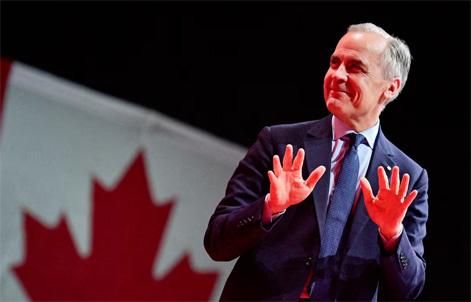|
Canada's
Prime
Minister
Mark
Carney
walks
into his
office
after
the
Liberal
Party
staged a
major
political
comeback
to
retain
power in
parliamentary
elections,
in
Ottawa,
Ontario,
Canada
April
29,
2025.
REUTERS/Jennifer
Gauthier |
|
|
|
|
|
 |
 |
 |
|
|
|
|
|
|
 |
|
|
Canada's
Prime
Minister
Mark
Carney
attends
an event
at the
Liberal
Party
election
night
headquarters
in
Ottawa,
Ontario,
Canada
April
29,
2025.
REUTERS/Jennifer
Gauthier |
| |
Mark
Carney's
victory
positions
Canada
as
Global
Counterweight
to
Trump’s
Nationalism
Patricia
Romero -
International
Tell Us
Toronto
OTTAWA,
ONT -
Canadian
Prime
Minister
Mark
Carney
staged a
remarkable
political
comeback
in
Monday’s
election,
securing
a
victory
for the
ruling
Liberals
and
setting
the
stage
for
Canada
to
assume a
greater
global
leadership
role
amid
rising
concerns
over
U.S.
President
Donald
Trump’s
protectionist
agenda.
Carney,
the
first
person
to have
led two
G7
central
banks,
brings a
rare
level of
economic
credibility
to the
office,
prompting
international
observers
to see
him as a
potential
champion
of
multilateralism.
His
pointed
critiques
of Trump
during
the
campaign
resonated
well
beyond
Canada’s
borders.
“Canada
is ready
to lead
a
coalition
of
like-minded
nations
that
share
our
values,”
Carney
said in
Ottawa
on April
3. “We
believe
in
global
cooperation
and the
free
flow of
goods,
services,
and
ideas.
If the
United
States
steps
back,
Canada
will
step
up.”
Carney’s
Liberals
defeated
the
Conservative
Party
led by
Pierre
Poilievre,
whose
“Canada
First”
message
and
confrontational
tone
drew
comparisons
to
Trump.
Though
the
Conservatives
had
maintained
a
polling
advantage
for
months,
their
support
collapsed
after
Trump
imposed
tariffs
on
Canada
and made
inflammatory
remarks
suggesting
annexation—moves
that
sparked
a
consumer
backlash
against
U.S.
goods
and
travel.
Despite
Carney's
personal
win, the
Liberals
appear
to have
secured
only a
minority
in the
House of
Commons,
forcing
them to
rely on
smaller
parties
to
govern—a
situation
that
could
limit
their
ability
to act
decisively.
Carney’s
campaign
momentum
has
drawn
international
attention,
especially
from
Australia,
where
political
strategists
say
voter
backlash
against
Trump-style
politics
is
bolstering
the
center-left
Labor
Party
ahead of
its May
3
election.
Former
diplomat
Colin
Robertson
praised
Carney
as
Canada’s
most
prepared
prime
minister
in
decades,
citing
his
leadership
at the
Bank of
Canada
and Bank
of
England.
“He
enters
office
with
deep
expertise
and
global
connections.
People
will
take his
calls
because
the
major
challenges
today
are
economic,”
said
Robertson.
Carney
is
expected
to
prioritize
strengthening
the
Canadian
economy,
starting
with
infrastructure
investment
and
diversifying
trade
away
from the
U.S.
toward
Europe,
Australia,
and
Asia-Pacific
democracies
like
Japan—moves
designed
to
cushion
the
impact
of
Trump’s
new
tariffs
on cars,
steel,
and
aluminum.
Walking
a
Diplomatic
Tightrope
As
leader
of the
G7’s
smallest
member,
Carney
faces
the
delicate
task of
building
international
alliances
without
provoking
Trump
directly.
“It’s a
difficult
tightrope,”
said
Roland
Paris, a
former
adviser
to
ex-Prime
Minister
Justin
Trudeau.
“Canada
has an
interest
in
working
with
like-minded
nations,
but not
in
becoming
a
lightning
rod for
Trump’s
retaliation.”
Paris
added
that
Carney’s
measured
demeanor
and
economic
gravitas
may
offer a
more
constructive
counterpoint
to Trump
than
Trudeau,
whom
Trump
famously
dismissed
as a
“governor.”
Robertson
expects
Carney
to seek
common
ground
with
Trump,
possibly
at the
G7
Leaders’
Summit
in
Alberta
this
June,
where a
trilateral
meeting
with
Trump
and
Mexican
President
Claudia
Sheinbaum
could
take
place.
Carney
has also
pledged
to
accelerate
military
spending,
reduce
Canada’s
dependence
on U.S.
defense
contracts,
and
engage
with the
EU’s
proposed
€800
billion
defense
initiative.
Yet some
experts
caution
against
overstating
Canada’s
global
influence.
Chris
Hernandez-Roy,
deputy
director
at the
Center
for
Strategic
and
International
Studies,
said
Carney
lacks
the
stature
of
figures
like
Germany’s
Angela
Merkel
or
France’s
Emmanuel
Macron.
“Canada’s
limited
military
capacity
and
stagnant
economy
constrain
its
leadership
potential,”
he said.
Still,
Canada’s
rotating
presidency
of the
G7 this
year
gives
Carney
an
influential
platform.
A Global
Backlash
Against
Trumpism
While
Carney’s
victory
offers
encouragement
to
center-left
leaders
abroad,
analysts
say his
success
is
difficult
to
replicate.
Trump’s
threats
against
Canada
posed a
unique
existential
challenge
that
galvanized
Canadian
voters.
In
Australia,
however,
Trump’s
unpopularity
appears
to be
undermining
conservative
leader
Peter
Dutton,
once
seen as
a viable
contender.
Polls
now show
Labor
either
winning
outright
or
forming
a
minority
government
with
independent
support.
“Trump
has been
a
wrecking
ball for
the
conservative
movement—both
here and
globally,”
said
Andrew
Carswell,
a former
press
secretary
to
ex-Prime
Minister
Scott
Morrison.
In
Hungary,
populist
leader
Viktor
Orbán—who
has
openly
praised
Trump—faces
mounting
opposition
amid
economic
woes and
growing
unease
with
Trump’s
aggressive
trade
tactics.
Meanwhile,
in the
U.K.,
Prime
Minister
Keir
Starmer
has
attempted
a more
diplomatic
stance
toward
Trump,
but it
has done
little
to boost
his
popularity.
Patrick
English
of
YouGov
notes
that
British
voters
remain
deeply
skeptical
of
Trump,
especially
over
tariffs
and
foreign
policy.
“If
Labour
wants to
regain
public
trust, a
firmer
stance
on Trump
could
help,”
English
said.
“In the
U.K.,
Trump’s
policies
are
unpopular.
In
Canada,
it’s
even
more
stark—supporting
Trump is
basically
un-Canadian.”
Richard
Johnston,
a
retired
political
science
professor,
sees a
broader
lesson
for
conservative
parties
globally:
“To win,
you may
need to
leave
the MAGA
rhetoric
behind.”
|
|
|
|
|
|
|
|
|